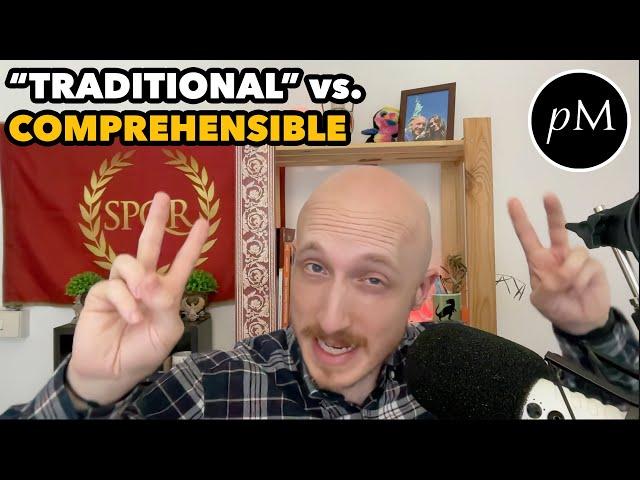
Why “Traditional” Methods Don’t Work for Latin or Greek (or any language!) 2nd Language Acquisition
Комментарии:

Can somebody recommend me a book like this for learning Hungarian?
Ответить
I agree with most of what you propose by far, but I really wish you stopped saying that when we get to a word we don't understand then we are blocked, because that isn't so Even in our native languages, when watching the news we are bombard with unknown vocabulary, which even context does not elucidate meaning, yet we understand the message. More importantly is that we understand the message. I've just finished Stendhal's Le Rouge et le Noir, and if I had followed your norms, I would not be even 25% through by now, and would have suffered the text rather than enjoyed this novel, as I truly did even though there were words I didn't in the moment understand their meaning, even if I fully understood the message and style of the text.
Ответить
Grammar-translation is very important and leads to comprehension. It cuts off a lot of time to learn new languages and minimise confusion. Without grammar-translation, you will memorise sentences that in turns slowing down the progress.
Especially when you learn a new language which has different grammar to your native language. Not knowing the target language grammar, only makes you create incomprehensible sentences to the learnt language. It's more like, for example, using English grammar while speaking Japanese, which is never understood by the native Japanese people.

I honestly think that it is only bad to learn through translations and traditional methods as long as there is one who will judge your translations not on the content, but why you didnt use their waxy of translation, which consists of a certain word list that you should use for your translation even when there is no sense in doing so. So they dont want you to understand that sentence, they want see you how you use the priorily made translation they have and how much you fit into that.
Ответить
I taught myself Ancient Greek (no prior experience with Latin) by using the traditional method: school textbook, memorizing the paradigms, doing the exercises, reading the text snippets over and over. I wasn’t quite ready to read Plato, but I was lucky that I could sit in a University Plato course for a semester as a guest and after that it was happy reading. Plato. Xenophon. A little Herodotus later. Still struggling with Homer and Sophocles, but will get there eventually, I hope…. Am in a little hiatus now, got fascinated by Sanskrit, which is like Ancient Greek on steroids…. Will see where it takes me. - but yes, my advice is to start reading original literature as soon as possible and feasible. Good luck on this most fascinating journey!
Ответить
I've had to explain this to my school leadership to make some significant changes to our Latin program. The original curriculum was heavy grammar translation using Henle and students were suffering. We've switched to immersive Latin and Lingua Latina. So far, I've seen enormous dividends in focusing on compelling content and making class a "conversation" as much as possible.
Ответить
The traditional methods do work, but they require a certain patience. Graded readers and per se are better.
Ответить
What is the evidence for CI working better than other methods for language acquisition. You said that such and such guy had a theory. But what actual data is there? I would very much appreciate it, if you presented some data, because if I want to convince other ancient language people of the method, I need actual data to be on my side.
Ответить
Really interesting, I'm nearly 60 and still can't speak French, but I can read it, in my 20's I went 3 years without reading a book or magazine in English, got through a lot of Asterix.
Ответить
I think language learning theory is a double bind, if not treated wisely psychologically as for many it could become the reason why you end up not studying your target language(s). Too much focus on finding the so-called best way for learning a language could just be a coping mechanism getting rid of the anxiety of the unknown.
The path is made by walking, it is not found. Really the best way of learning a language is first of all studying it!
I think people often fail because they are not accustomed to any form of self-learning, hence is prefered "immersion" rather than "intented comprehensible initial exposure," which is likely to be the most critical phase. Once you get through it and are finally partially able to consume content in your target language, that is exactly when the 5 principles of comprehensible input theory take place, that is when you are in the language.
So I believe that the teachers/instructors/writers' role is to make that initial phase alike to the second phase I depicted above. How can we make the student live in the language, annihilate that distance between the learner and that-which-is-being-learned, until just above that threshold where the learner can sail by himself. The books like Familia Romana are good to the extent they manage to do it.
The initial point I was trying to make is similar to that celebrated Buddhist parable of the poisoned arrow. Upon being asked 14 unanswerable metaphysical questions, Gautama speaks:
"It's just as if a man were wounded with an arrow thickly smeared with poison. His friends & companions, kinsmen & relatives would provide him with a surgeon, and the man would say, 'I won't have this arrow removed until I know whether the man who wounded me was a noble warrior, a priest, a merchant, or a worker.' He would say, 'I won't have this arrow removed until I know the given name & clan name of the man who wounded me... until I know whether he was tall, medium, or short... until I know whether he was dark, ruddy-brown, or golden-colored... until I know his home village, town, or city... until I know whether the bow with which I was wounded was a long bow or a crossbow... until I know whether the bowstring with which I was wounded was fiber, bamboo threads, sinew, hemp, or bark... until I know whether the shaft with which I was wounded was wild or cultivated... until I know whether the feathers of the shaft with which I was wounded were those of a vulture, a stork, a hawk, a peacock, or another bird... until I know whether the shaft with which I was wounded was bound with the sinew of an ox, a water buffalo, a langur, or a monkey.' He would say, 'I won't have this arrow removed until I know whether the shaft with which I was wounded was that of a common arrow, a curved arrow, a barbed, a calf-toothed, or an oleander arrow.' The man would die and those things would still remain unknown to him."

My question now is: why does the grammar translation method exist? When did it replace the ancient way of teaching languages that was mostly based on the natural one?
Ответить
I’ve been doing the input method with Lingua Latina (inspired by your video recommending it) and it’s great. It’s not just a great way to learn, it’s also really fun to start out already reading the language even before you’ve gone through any formal training/grammar learning. Super rewarding
Ответить
Ciao! sono un linguista focalizzato in lingue moderne, questo è stato un ottimo video sul processo di apprendimento di una nuova lingua. Sin da quando ho visto il tuo video del 2020 sull’”extensive reading” sono diventato promotore del metodo che ho rinominato “esperienziale” perché ci forza ad usare la lingua ed interagire con essa attivamente anziché parlare di essa tramite regole grammaticali. Trovo lampante l’esempio che hai fatto sulla differenza tra leggere il manuale di volo di un aereo ed effettivamente pilotarlo. Limitandosi a leggere il manuale di volo non è possibile imparare a volare. Mi piacerebbe in futuro imparare il greco antico, evitando però il metodo grammaticale. Ho fatto un tentativo in passato ma non avendo avuto nessuno che mi dasse degli input non sono andato lontano. Ho trovato una marcata mancanza di contenuti, per esempio ogni libro non ti dice nemmeno come dire “ciao” in greco antico. Qualunque libro di testo su una lingua moderna avrebbe questo in prima pagina. Se potessi mandarmi un link ad una guida su come iniziare con la lingua sarebbe fantastico. Non sono stato in grado di vedere molti dei tuoi video per via di limitazioni di tempo quindi non sono riuscito a costruire un metodo strutturato su come iniziare. La mancanza di contenuti esperienziali non ha certo aiutato. Sono aperto a qualunque suggerimento che possa aiutarmi a definire un piano strutturato. È un piacere parlare con qualcuno che mette così tanta passione e dà ispirazione nell’apprendimento delle lingue!
Ответить
Why does English sound so irritating and repelling when it comes to pronouncing Latin and Greek names ?
Ответить
I literaly have built myself up to communicating in simple 1st year latin, by watching these top latin channels for a year, and now i am starting to go back to my books and reread them. Now that i have a better feel for the language in a spoken and read way for the last year. Now i can go back and learn the offical rules.❤ i now walk through my house and speak to my cats and dog in latin lol
Ответить
Duolingo 100 days streak 😎😎💪
Ответить
Another reason the grammar-translation method doesn't work is idiom. Knowing all the vocabulary and grammar will only tell you how something may be said or if it's correct, but not how a native speaker would say something. I'll use Albanian (specifically the Geg dialect), my parents' (but unfortunately not my own) native language. If you want to know where your shoes are, you can translate the sentence "where are my shoes?" from English into Albanian as "Ku janë kpucët e mij?" and that is a sensical, grammatically correct sentence, but it's not how a native Albanian speaker would ask that question. An Albanian would say "Ku i kam kpucët?" which literally means "Where do I have the shoes?". Idioms like this are used frequently enough to be easily learned, but Albanian has so many idioms that they get more in the way of understanding the language than grammar and vocab do. I can't tell you how many times I've come across a sentence and knew every single word in the sentence, and understood the grammar perfectly, but could not for the life of me understand what the sentence meant until I consulted a native speaker. And sometimes the native speaker couldn't explain it; it just means what it means.
If you sat at a table of Albanian speakers and recorded their conversation, and then translated literally everything they were saying into English, half of it would seem complete nonsense, and I'm sure this is true of most languages.
Just for fun, here's the beginning of one of my favorite Albanian fables translated literally into English:
There had had been a king. This didn't have but a boy. When the boy was made to him for marriage, he called him and said to him:
"Look sonny, and find the wife yourself! Take the canon and empty it, and there where it kills, there you will take also the wife."
The boy takes the canon and he empties it bim-bau! and it goes and it kills to him on shore of sea to the root of a dry oak. He shoots of the second, and it kills to him in that place because in that place. He shoots of the third and again in that place because in that place.
"I swear" he says, "May I not go to see what will be there."
He goes to the dry oak and finds a big turtle.
"And this turtle" he says, "what can it be of value to me?"
And he takes it with himself and leaves it on window of his room.
When he turns in evening, he finds the room sweeped and dusted and every single thing in its place.
"And thus" he says, "how? Who did these works to me? The room I have had locked!" And he is not knowing to whom to leave it.
You can kind of make sense of it, but imagine trying to go the other way, trying to express yourself in Albanian as an English speaker, knowing only grammar and vocabulary: it would sound so awkward and blocky, never using any native idioms, and twice as long as it has to be.
The only way to learn idiom is to soak up enough comprehensible input in the language to just get used to it.
Ehh, I had more to write, but I have an assignment due at midnight.

What is your opinion on the Traditional Latin Mass?
Ответить
We definitely need the Rainieri-Roberts approach for Latin next!
Ответить
Kikero
Ответить
I've noticed that when I keep up with the Torah portion (or at least try to) my spoken Hebrew is a lot better than when I just go to class and do my homework.
Its amazing how necessary actually using the language is.

In truth, there probably is no one-size-fits-all method for learning languages, since languages differ fundamentally in how they organize information (e.g. analysis vs synthesis). Our ability to process that information is contingent on our sensitivity to whatever cues a language may use (word order, inflection, etc). There is evidence that the brains of different language speakers are wired differently. In other words, the most effective method of language acquisition for you will depend heavily on the language in question and on which other languages you already know. Ultimately, however, the most reliable predictor of success is exposure. If you commit several hours a day to the study of a language, you are probably going to experience success regardless of the method. If, on the other hand, you limit yourself to reading one Latin paragraph per week or less, no wonder method will save you.
Ответить
Question:
How did you become fluent in Latin? Do you have a video somewhere explaining your own Latin journey? I am a homeschooler learning Latin with my children, and since I have a lot of them who move through various ages and levels, I have been learning Latin for over a decade. I started with what I now know is less effective--the grammar-translation Forms Series by Memoria Press, which vehemently argues against what you say in this video. We switched to LLPSI Familia Romana a year ago and reading fluency exploded, as well as enjoyment. But I wonder--can one learn complex grammar just through comprehensible input? Especially when trying to compose in the language? I went into LLPSI already having memorized all the grammar paradigms and many, many rules, as Memoria Press has the students recite forms and rules in choro every day. So I understand a lot of Latin grammar. Because of this, it is hard for me to know whether learning Latin through comprehensible input, or the natural method a la Orberg, is enough to help people produce in speech and writing correct Latin in complex constructions. I already knew so much grammar going in, including verbals and subjunctive in independent and dependent clauses, etc. and could recognize on sight the characteristics of an inflected word by its form. Would a person with zero grammar exposure be able to learn all that from Orberg alone? I also wonder how to avoid translating in my head. In the early chapters of LLPSI FR, I don't need to translate explicitly, but the English meaning is there with the Latin--Roma in Italia est ... I know what it means, but the English is also there in my mind. Impossible to keep it out--it is so ingrained in me being my native language (the same goes for Spanish ... I used to be relatively fluent and could hold conversations about complex topics such as what Catholics believe ... but English was always in my mind with the Spanish. I learned Spanish in high school the "traditional" grammar first/memorize vocab lists way in the 1990s, but we also watched Destinos; my college Spanish courses were all conducted in Spanish, in which we read Spanish literature and wrote essays in Spanish. But I was translating mentally that whole time, thinking things like, How would I express this idea in Spanish?) When LLPSI FR becomes complex in the later chapters, I am not really understanding it in the first reading without translating mentally and working it out like a puzzle. After I do that, I can then understand it on a second and subsequent reading. I find the Companion by Neumann very, very helpful--because I do find an explanation of grammar necessary in understanding the text. Having said that, I picked up Richie's Fabulae Faciles and need very few of the grammar notes and know most of the core vocab. After looking up unknown words in the per-story glosses when context wasn't enough, I would then re-read the stories and understand them. But I feel like I am still translating mentally, or at least English is present with the Latin. So I would appreciate hearing from people who to read Latin without translating, and who learned complex grammar without learning it in your native language. How do you do that? Thanks.

In my experience, the general method used to teach Latin or Greek is completely different from the method used to teach a foreign language. Because the goal is different. The goal of learning Latin and Greek is to be able to read a text and understand it by translating it. The goal is not to be able to communicate in Latin or Greek. While learning a foreign language has the primary goal of communicating. You learn a foreign language because you want to be able to communicate in this language. Honestly, I don't like the communicative method because it neglects grammar too much. The communicative method works well with isolate languages like Chinese or English that don't rely too much on morphology to convey meaning. In English you learn words you put them together and 90% of time you have a correct sentence. But in other languages grammar is so important that becomes a fundamental aspect of the learning process. I taught Italian in a language school for migrants for 2 years using the communicative method. The results: they eventually can communicate but they still make a lot of silly grammar mistakes.
Ответить
As an autodidact using mostly input in my study of Persian and Japanese, one thing ive found is that massive input is indespensible in gaining an intuititive, native like comprehension of a language, but that accessing vocabulary when outputting, or using our L2s in an intelligent, idiomatic way is a somewhat separate skill that has to be cultivated on its own.
For kyself I've been trying to pay cliser attention to HOW people speak or write in my L2 in order to speak better

I would say one of the main reasons you need "real, understandable input" is because acquiring a new languange is best done via (negative) feedback where you need to make actual mistakes and adjust yourself accordingly. In that light, translating from a native language to one studied will, in my opinion, contribute more to language proficiency than the other way around as there will be many more opportunities to make mistakes and get stumped. To me, if you can immediately write down a story of moderate complexity in a target language without too many external aids, you are very likely to be able to hold a normal conversation in the language (but NOT the other way around).
Ответить
You have to adquire a language in order to study it's grammar.
Ответить
I studied Latin with the traditional Italian method which began with the study of grammar. Years later, continuing to study Latin, I had the same approach to German. Today I still remember all the peculiarities, from the declension of oak to the German definite articles. I can't hold a conversation in Latin or even German. I calmly manage to translate, keeping the dictionary next to me. My mum did the same to me with English but luckily I met Deborah from London and lived with her (who didn't want to learn Italian) for two years. Even though many years have passed, I write in English straight away and don't use the dictionary. The only ones who learn Latin the right way are Catholic priests who are forced to consider it a living language and have conversations in Latin
Ответить
Stephen Krashen has a famous video , using teaching the German language to introduce the concept of 'comprehensible input' to an expectant world.
He draws a circle, and then draws a nose on it, and says 'die Nase'.
He clasps his head in his hands and says 'Kopf'.
He writes the symbol '2' and then says 'Zwei'.
Allegedly, this is 'comprehensible input'.... I beg to differ.
How in the world is that not explicit instruction?
How is this different from a traditional textbook, which has a picture of a face and labelled arrows pointing to features on a face?

I’d like to start a community for Biblical Hebrew. Can you help with that?
Ответить
after four years of ancient greek and latin i could get As on all my translation tests but barely read. what is taught is basically puzzle solving more than any kind of language. the only thing that worked for me was picking an author and reading a ton of them, throwing the grammar books away, and going to a dictionary only when absolutely necessary.
Ответить
When I learned Latin at school back in the early to mid 2000s, while our methods were focused on grammar, especially the early phases definitely had elements of comprehensible input. Our textbooks had very simple introductory texts that had been written as teaching materials - they weren't dissimilar to Familia Romana in that way. Now, we also started out with our first declinations and conjugations and we barely did any text production in Latin beyond greeting our teachers (which was certainly a shame), but nobody tried to make us read originals until we had more than a year of basic training in Latin with materials that had been designed to be comprehensible for our relative level of proficiency. My main point of criticism is that we only ever worked from Latin into our language and were almost never encouraged to work in Latin itself, i.e. speak, write or think in Latin.
Ответить
What is the best approach for a native romance language speaker?
Ответить
This makes sense to me. When you learn english, you learn it and understand it, but occasionally have to ask what words mean in english. Other language acquisition is similar, intuit it until you inderstand the important concepts and the images asspciated with them, then use the language itself to expand the language. Like how you originially got the grammar from immersion in english, but the reason for that grammar was explained later on when you took english classes.
Ответить
How would you motivate students in a classroom to approach a Latin text such as LLPSI from a CI standpoint and not rush to grammatical explanations or get frustrated with the process? Even students who haven't been brought up on a traditional grammar/translation approach still rush to the grammar or give up rather than taking the time to work through the language.
Ответить
What do you think of language transfer?
Ответить
Studied French and Russian in school about 10 years ago for around 1,5 years. Eventually lost interest at cramming grammar and quit. I started watching anime around the same time I quit French and Russian. I've racked up about 6000 hours of listening to Japanese since then with grammar study in the double digits. I wouldn't call myself fluent by any means, but I think I've got a pretty solid grasp of the language, and I feel like I've barely had to lift a finger (until starting to seriously learn kanji recently, but even that turned out to be a pretty interesting subject matter). By comparision the time I spent on Russian and French feels completely wasted. I can recall about 0% of the grammar I crammed back then, and only a small fraction of the vocabulary. Granted this was ages ago, but if you're going to forget you should at least have fun while learning.
Ответить
Shameless, Luke! Shameless that you put your pic next to Mireille's from French in Action.
Ответить
I learn latin in Orthodox Seminary in Russia now. At class i lean latin with traditional method, but outside the class i learn latin with language acquisition's method. Both methods work for me, because i like grammatical study. Language acquisition is also working for me to know latin context more deeply.
Ответить
Not sure your over critique of Grammar translate is totally warranted, especially with Ancient languages. Specifically I’m thinking of Greek. I’m interested and trying to learn Koine Greek to read the New Testament. Both Classical and Koine Greek are no longer spoken and differ from Modern Greek. So how is there a better way to acquire Koine than the Grammar Translate method. The is uncertainty as what pronunciation to use and in the rare case I may bump into someone else who knows Greek I’m not sure it worth the effort in that area since my main goal is to read the text
Ответить
i found this video as a great “signs you’re on the right track” message 🙂
Ответить
The analogy of grammar being how to build a vehicle seems fallacious to me. For me, learning grammar is an essential part of learning how a language works and beginning the process of appropriation. It isn't the alpha and omega, but it's one important aspect among many others.
Ответить
For me, the immediate question that arises whenever anything traditional is criticized is this: If this method is ineffective, how did it traditionally become so widespread? surely someone would have noticed?
& if grammar-translation methods are not traditional but modern, what method was used before, ie actually *traditional*?

In my experience, language classes or books that present a set of phrases that I'm supposed to memorize without any discussion about the etymologies of the words, the way that grammar works, and the means by which the words work together doesn't help me. I make my quickest progress when I get a rule of grammar, a set of words with detailed definitions, and sentences from native use of that language that employ the first two.
Ответить
I am surprised @polyMATHY_Luke didn’t reference his Ranieri-Dowling Method in this video. Because that utilizes the “traditional” method but of course it is also comprehensible input based.
Ответить

























